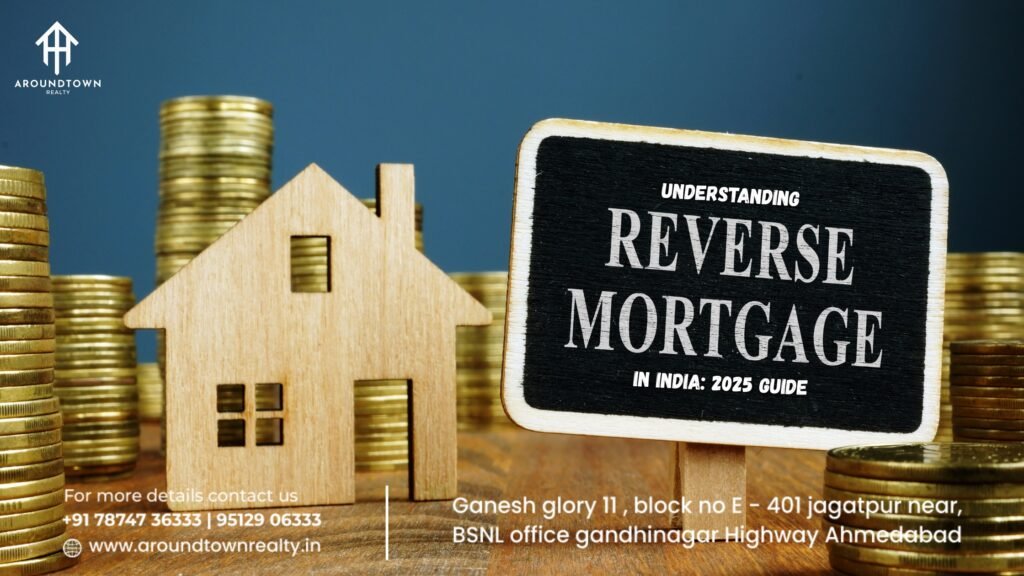As India continues to evolve into a financially empowered society, the focus on securing post-retirement income has become stronger than ever. One financial product that’s slowly gaining attention among senior citizens is the reverse mortgage. While common in western markets, it’s still a relatively new concept in India, often misunderstood or underutilized.
This 2025 guide to understanding reverse mortgages in India explains how this tool works, who it’s for, the pros and cons, legal considerations, tax implications, and the current market sentiment around it. Whether you’re a retiree exploring income options or a family member helping your elders secure financial independence, this blog gives you everything you need to make informed decisions.
What is a Reverse Mortgage?
A reverse mortgage is a financial arrangement that allows senior citizens (aged 60 and above) to borrow money against the value of their home. Unlike a traditional loan where the borrower makes monthly payments to repay the loan, in a reverse mortgage, the lender pays the borrower—usually in the form of monthly installments, lump sum, or a line of credit.
The loan is repaid only when the borrower sells the house, permanently moves out, or passes away. At that point, the proceeds from the sale are used to repay the loan (including interest), and the remaining amount (if any) is handed over to the heirs or the estate.
How Reverse Mortgages Work in India
In India, reverse mortgages are governed by the Reserve Bank of India (RBI) and are typically offered by leading banks and housing finance companies. Here’s how the process generally works:
- Eligibility:
- Must be 60 years or older (some banks allow joint ownership with a spouse over 55).
- Must own a self-occupied residential property (free from litigation).
- The home should be fully constructed and in good condition.
- Loan Amount:
- Based on the property’s market value, borrower’s age, and interest rates.
- Generally ranges from 60% to 80% of the home’s value.
- Maximum tenure: 15–20 years, or till the borrower’s lifetime, depending on the product.
- Disbursement Options:
- Monthly payouts (annuity style).
- Lump sum (subject to caps).
- Credit line (withdraw when required).
- Combination of the above.
- Interest Rate:
- Usually floating, between 8.5%–11% annually.
- Interest gets added to the loan balance, and isn’t payable monthly.
- Repayment:
- No monthly repayments by the borrower.
- Loan is settled when the borrower dies or moves out permanently.
- Property is sold, and lender recovers the dues. Excess, if any, goes to heirs.
Pros of Reverse Mortgages in India
1. Financial Freedom for Retirees
It helps retired individuals access a regular source of income without having to sell or leave their home.
2. No Monthly Repayments
Borrowers aren’t burdened by EMIs. This is crucial for those living on pensions or limited savings.
3. Stays in the Borrower’s Name
The ownership of the home remains with the borrower throughout their lifetime unless explicitly agreed upon otherwise.
4. Heirs Can Retain the Property
Heirs can choose to repay the outstanding amount and retain the home if they wish.
5. Backed by Regulations
The scheme is RBI-regulated, ensuring transparency and borrower safety.
Cons of Reverse Mortgages in India
1. Low Awareness and Limited Availability
Despite being available since 2007, reverse mortgages are not widely marketed. Only a few lenders actively offer them.
2. Lower Loan Amounts
The loan-to-value ratio is conservative, and property appreciation isn’t considered aggressively.
3. Inheritance Concerns
Since the loan is repaid via property sale, heirs might not receive the full property or could lose it altogether unless they repay.
4. Property Value Risks
If the property deteriorates or depreciates, it may not cover the entire loan value upon repayment.
5. Limited to Self-Occupied Homes
You can’t avail a reverse mortgage against rented or commercial properties.
Tax Implications of Reverse Mortgages
As per the Income Tax Act of India, reverse mortgage payments:
- Are not considered income, and therefore are not taxable.
- No tax deduction on the interest accrued since the borrower isn’t making repayments during their lifetime.
- The final sale of the house to settle the loan may have capital gains tax implications depending on how the legal title is transferred.
Key Considerations Before Applying
- Do a proper valuation of the home through an independent party.
- Discuss plans with family members or heirs, especially if they wish to retain the house later.
- Compare interest rates and terms from multiple lenders.
- Understand tenure limits and whether the disbursal suits your lifestyle (monthly vs. lump sum).
- Keep track of legal documents, succession plans, and any encumbrance.
Top Banks & Institutions Offering Reverse Mortgages in 2025
- State Bank of India (SBI)
- Punjab National Bank (PNB)
- Canara Bank
- Central Bank of India
- LIC Housing Finance
- Dewan Housing Finance Limited (DHFL) (if available post restructuring)
Who Should Consider a Reverse Mortgage?
- Retirees with no pension or insufficient regular income.
- Senior citizens who own a property but don’t wish to sell or downsize.
- Individuals with limited family support or no legal heirs.
- Those wanting to fund post-retirement goals like healthcare, travel, or living expenses without disturbing savings.
Alternatives to Reverse Mortgage
- Renting out a portion of the home for additional income.
- Downsizing to a smaller property and investing the surplus.
- Structured pension or annuity plans.
- Investing in senior citizen fixed deposits, bonds, or mutual funds.
Conclusion: Should You Consider a Reverse Mortgage in 2025?
If you or your parents are sitting on a valuable property but facing liquidity issues in retirement, a reverse mortgage could be a lifeline. It offers a dignified way to stay financially independent, while continuing to live in one’s own home.
However, it’s important to approach this decision with clarity and legal support. Not all properties are eligible, not all banks are offering fair terms, and not every family situation may be ideal for this scheme. CHECK OUT ATR PROPERTIES FOR MORE SUCH INSIGHTFUL INFORMATION.
FAQs: Understanding Reverse Mortgages in India
- Who is eligible for a reverse mortgage in India?
Individuals aged 60 or above (55 for spouse in case of joint application), owning a self-occupied residential property. - What happens to the house after the borrower passes away?
The lender sells the property to recover the dues. Any remaining balance goes to the legal heirs. - Can heirs keep the house?
Yes, if they repay the total outstanding loan with interest, they can retain the home. - Are reverse mortgage payouts taxable?
No, the payouts are not considered income and are tax-exempt under current Indian laws. - Is the loan amount fixed or flexible?
It depends on the property value, borrower’s age, and lender policy. It can be disbursed monthly, as a lump sum, or a mix.









